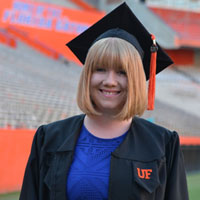When Julia Woodward began her first year at the University of Florida, she did not know that her interests in design, art, and computing would ultimately merge to form an exciting path in computing research. During an introductory meeting for the Digital Arts and Science major, several professors gave presentations on their work and research interests. Julia was particularly intrigued by the work of Dr. Lisa Anthony, whose research focuses on child-computer interaction. Julia reached out to Professor Anthony who agreed to advise her in research.
Julia worked with her advisor to investigate how interface complexity affects touch and gesture interactions on touchscreen phones. She remained involved in research during the academic years and summers, eventually taking the lead on three projects. As she gained experience, Julia began to develop her own research questions focused on the design of better touch and gesture interfaces for children. One project has since expanded to include two additional undergraduate students managed by Julia in collaboration with the University of Washington’s KidsTeam, directed by Dr. Jason Yip. Julia’s collaboration with other undergraduates and graduate students has led to several publications, including two on which she was the first author and others in prestigious international conferences and journals including the ACM Conference on Human Factors in Computing (CHI).
When asked what she likes best about research, she said, “Nothing usually goes as planned, and you have to adapt to new situations.” Julia notes that research has helped her develop as a professional. She says that research “increased my leadership, project management, and communication skills as well as making me more determined and forward-thinking. I am able to develop key research questions, and I am also able to design research inquiries to answer these questions.” Her advice to students who are interested in participating in research is to trust that although it can sometimes be challenging to juggle research and coursework, it is certainly possible to do both. She also notes the importance of reaching out to professors with whom you might want to work.
Citing a desire to contribute to the future of human-centered computing, Julia has decided to remain at the University of Florida, where she is now pursuing a Ph.D. in the Human-Centered Computing program under Dr. Jaime Ruiz. She is currently extending her previous research to explore collaboration between children using multi-touch tabletop computers. Five years ago, Julia had never considered a career in research, but today, she “couldn’t imagine doing anything else.”
– Written and edited by Booma S Balasubramani and Keith Feldman
